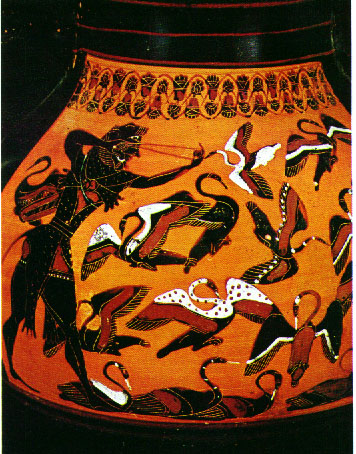| Megara was the first wife of Heracles |
After doing a little research following the assigned reading on the notorious figure Hercules, or Heracles, I came across the eventful past of the hero preceding the selection we read from Ovid. We touched on his origins briefly awhile back but important to recall how his tale began before taking into account the last third of his life recalled in Metamorphosis; as the illegitimate son of Jupiter (Zeus) and a mortal woman named Alcmene, Heracles was subjected to many acts of vicious jealousy from Juno (Hera) including a murder attempt via serpents and a curse of madness that led the unfortunate super-mortal to murdering his wife and three children. This was the first stage of this hero's life that drove the heroic acts to come later in his tale.
After the tragic end of his family, Heracles sought the advice of an oracle to determine when he would regain his honor and be free of this great burden. She advised him to serve the king of Mycenae for 12 years and complete the 12 great tasks that he and the great goddess Juno outlined. These tasks included great tests in skill, strength, wit, and resourcefulness and are known as "The Twelve Labors of Hercules".
 |
| Heracles killing the Stymphalian birds |
These labors included a variety of heroism including killing the Nemean Lion; conquering the nine-headed Hydra by burning the stumps of the heads after they were cut off; bringing back the golden-horned stag alive; capturing a wild boar that was terrorizing Mycenae; cleaning the Augean stables where thousands of cattle lived, in one day; which he did by diverting two rivers causing them to flow into the stables; destroying the man-eating Stymphalian birds via poison-tipped arrows; capturing a Cretean savage bull; capturing the four man-eating mares of Thrace; obtaining the girdle of the Amazon queen while Juno convinced the Amazons that he was trying to take her from them so he had to fight them off; capturing the cattle of the monster, Geryon; getting the golden-apples of the Hesperides by telling Atlas he would hold the world for him in exchange for the apples and then tricked him to taking it back; and finally bringing Cerberus to the surface without using weapons by gaining control of two of Cerberus' heads. It is said that upon the completion of all these tasks, Hercules was now a "free man" and this is where the Ovid's account picks up.
 |
| Heracles conquering Cerberus, guardian of the underworld |
However this "twelve labors" leads me to question how much of a "hero" Heracles really was... clearly he only engaged in this heroic and seemingly selfless acts of putting himself at risk in order to ensure the safety of others in order to the fulfill self interested objective of regaining honor from what his past dictates. Although these acts were beneficial to the people as a whole at Heracles's own expense, shouldn't a "hero" be thought of someone who does these things out of a pure motivation to use his god-given strength and advantages to help his fellow man who may not be able to help himself? The only reason Heracles was in any position to be considered a "hero" was his exceptional strength from him divine lineage that enabled him to even complete any of these labors. So I ask, what makes a hero? Circumstance or motivation?
No comments:
Post a Comment